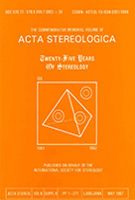Stereology and morphometry of steatosis in human alcoholic (ALD) and non-alcoholic liver disease (NALD)
Abstract
Steatosis is one of the main features of alcoholic liver disease (ALD) and may be seen in some patients with non alcoholic liver disease (NALD). In this study we have quantitatively assessed steatosis in relation to histopathological and clinical categories of ALD and NALD by stereological and morphometric techniques.
Haematoxylin and eosin (H&E) stained sections from ninety-two needle liver biopsies were analysed using the Prodit 5.2 system. All biopsies were categorized into five histopathological groups: normal, pure steatosis, steatofibrosis, pre cirrhosis and cirrhosis. The area fraction (Aa) of fibrosis, steatosis and parenchyma were assessed by stereological method. The mean diameter, area and area ratio of fat globules in zone 1 and zone 3 were determined by morphometric analysis. Stereological analysis has shown significant variation in the area fraction of fat in different histopathological categories reaching a maximum value of 54% of liver cell parenchyma. Significant differences in the areas of steatosis were observed between the clinical groups (ie ALD and NALD). Morphometric analysis showed significant differences in diameter of fat globules between zone 1 and zone 3 in the two major clinical categories. In alchoholic liver disease fat globules are mainly large and pericentral in location whereas in the non alchoholic group the fat globules are smaller and periportal in location.
It can be concluded from this study that quantitative analyses are useful techniques to differentiate between ALD and some sub-clinical categories of NALD. Stereology has the advantages of assessing steatosis in the entire liver biopsy specimen while morphometry is very useful for assessing steatosis in relation to topography.

